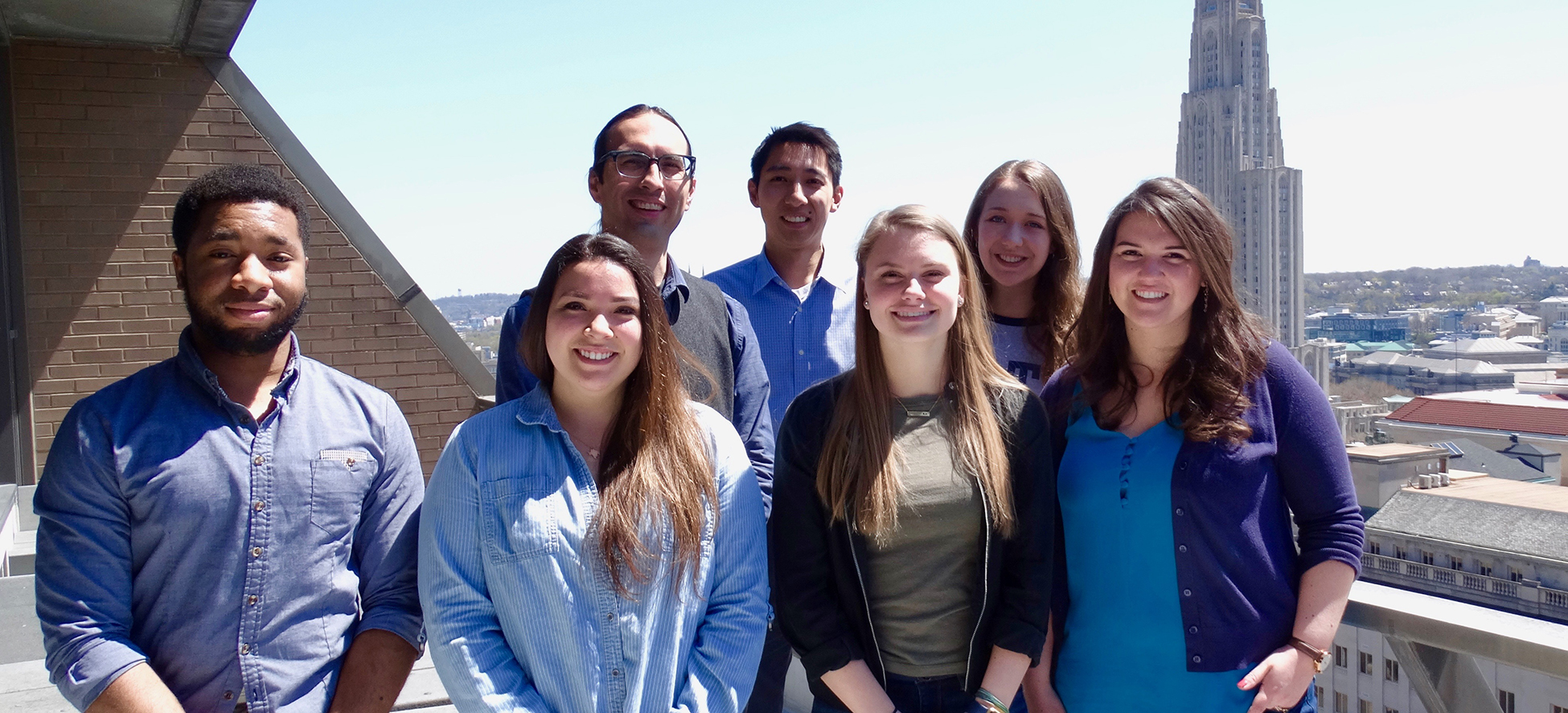Graduate Students & Post-Docs
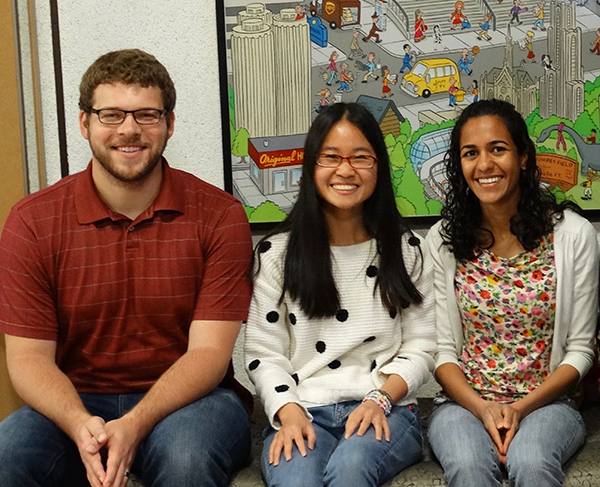
Research Opportunities: We conduct basic research on domain-general learning processes. We also study learning in specific educationally important domains, including reading and literacy, language learning, science learning, and the development of mathematical understanding. Graduate students participate in all these activities alongside the faculty who mentor them. The LRDC research page describes the types of research conducted at LRDC.
Methodologies: At LRDC, students broaden their knowledge about quantitative and qualitative research methods, as well as methodologies specific to their field(s) of study. School of Education students learn about improvement science methodology. Psychology and Neuroscience students use methodologies such as behavioral responses, reaction times, eye tracking, electroencephalography (EEG), functional magnetic resonance imaging (fMRI), and magnetoencephalography (MEG). Research labs in the LRDC often use advanced analytical techniques to identify and understand signals within neural activity, including machine learning, multi-voxel pattern analysis, and other multivariate approaches. All are invited to join the Community for Advanced Methodological Learning (CaMEL), a student-run organization focused on advanced quantitative methodologies.
University of Pittsburgh Post Doctoral Fellows: The scientific training and professional career development of postdocs are supported by a variety of institutional programs and services. Visit the University of Pittsburgh Postdoctoral Training.
Undergraduate Students
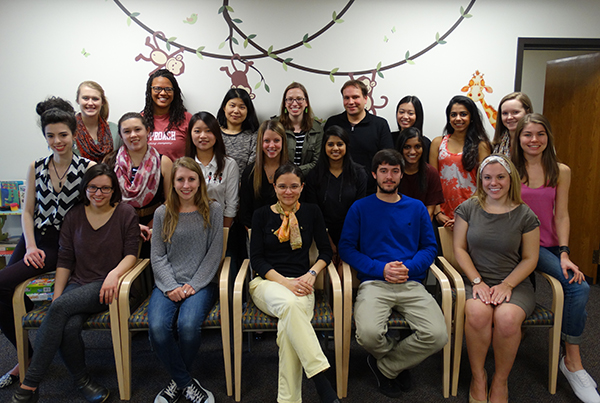
At LRDC, undergraduate students from varying departments across campus gain exposure to various aspects of the research process, such as data collection, data entry, data analysis, and presentations. Undergraduate students join LRDC through the following programs:
First Experience in Research: In the First Experiences in Research (FE-R) program, students can gain meaningful, hands-on research experience working with faculty in their very first year.
Directed Research: The Department of Psychology's Directed Research allows students to work with faculty and graduate students in approved labs where students gain exposure to various aspects of the research.
The BPhil Honor's Thesis: The Bachelor of Philosophy (BPhil) Honor's Thesis is a highly regarded credential that requires a rigorous curriculum and independent research (under the guidance of a dedicated faculty mentor).
Learning Sciences Transcript Distinction
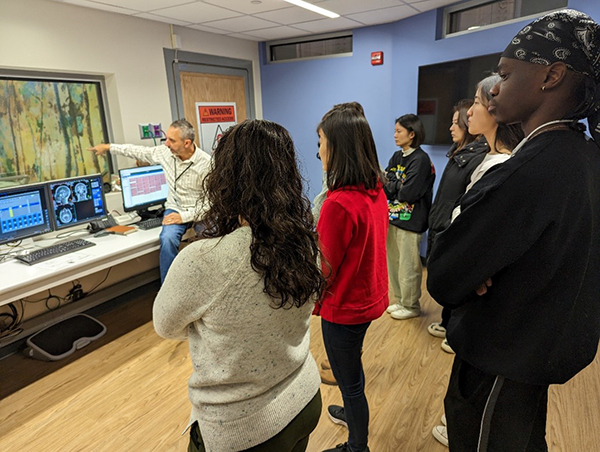
Unlock Your Potential with the new Undergraduate Transcript Distinction in the Learning Sciences! Develop understanding of learning processes and the factors that shape successful learning. See the Learning Sciences Transcript Distinction page for more information.
Collaborative Research Opportunities

Interdisciplinary Research Teams: Many graduate students form part of interdisciplinary research teams. In 2019, LRDC graduate students engaged in partnership programs with local universities (CMU), local initiatives (Pittsburgh Promise), local cultural institutions (Carnegie Museum of Natural History), local schools, and international collaborations.
Cross-University Academic Programs: LRDC scientists are part of other multidisciplinary organizations at the University of Pittsburgh, and students also participate in the Center for the Neural Basis of Cognition (CNBC), a partnership between the University of Pittsburgh and Carnegie Mellon University (CMU), and the Intelligent Systems Program (ISP), a multidisciplinary graduate program dedicated to the study of applied artificial intelligence.
Center Associates: LRDC researchers also connect with many other schools and departments across the University of Pittsburgh through joint appointments and collaborative research, which students also participate in. These connections currently include the Joseph M. Katz Graduate School of Business, School of Arts and Sciences (Departments of Computer Science, English, Linguistics, School of Law, and Swanson School of Engineering).
Diversity & Inclusion
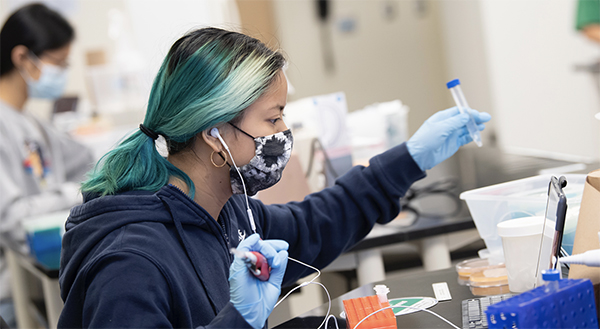
The Learning Research & Development Center (LRDC) is committed to training students of all backgrounds in our undergraduate and graduate training programs, faculty labs, and all faculty research.
Committee on Diversity, Equity, and Inclusion (CODIE): Builds racial and cultural competence within ourselves, our units, and our organization to support culturally and linguistically responsive, equitable practices and to have every member of LRDC accountable for this goal. We work to build racial and cultural competence within ourselves, our units, and our organization to support culturally and linguistically responsive, equitable practices and to have every member of LRDC accountable for this goal. We aim for broad representation of the many perspectives and social identities at LRDC. Learn more about the Committee on Diversity, Equity, and Inclusion (CODIE).
Psychology Committee on Equity, Inclusion, and Community (PEIC): Open to faculty, students, and staff, the PEIC plays a key role in building and supporting a diverse, equitable, and inclusive community of scholars. Click here to read PEIC mission statement. To learn more about PEIC and how you can become a member, please email Shirley Duong (shd77@pitt.edu) or Bev Conrique (bconrique@pitt.edu) with your interest. View the PEIC mission statement.
Hot Metal Bridge Program: This two-semester post-baccalaureate fellowship program is designed to help talented students from groups traditionally underrepresented in their academic disciplines, including first-generation graduate students and those from disadvantaged socio-economic backgrounds, to bridge the gap between an undergraduate degree and a graduate training program. Apply for Hot Metal Bridge 2021-2022 Program here.
LRDC Undergraduate Summer Research Internship : LRDC offers undergraduate internships to promote broader participation in training in the Learning Sciences. LRDC will gain experience in the Learning Sciences (research on instruction and learning) by working on a project with a faculty member who specializes in this area. For more details and information about the application process, visit the LRDC Undergraduate Summer Research Internship.
Student Communities
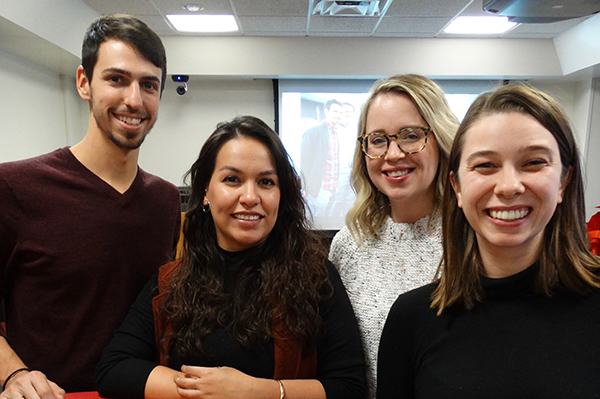
LRDC Graduate Student Council: The LRDC Graduate Student Council (GSC) is comprised of representatives from all disciplines in the Center to provide students with opportunities for cross-disciplinary collaboration, professional development, representation at LRDC Executive Committee meetings, and social opportunities.
2024 Graduate Student Council Members
Morgan Gray - Intelligent Systems Program (ISP)
Jessica Macaluso - Cognitive Psychology, GSC Representative on LRDC Executive Committee (EC)
Jorge Cavalho Pereria - Developmental Psychology
Chelsea Ptak - Developmental Psychology
Paras Sharma - School of Computing & Information (SCI)
Michael Tumminia - Education, Psychology in Education Program
Huihui Xu - Intelligent Systems Program (ISP)
LRDC Graduate Student Council (GSC) Award
The GSC has created and oversees the LRDC GSC Award, which provides financial support for the development of new, innovative, and interdisciplinary research conducted by graduate students within LRDC (amount of award varies based on request). Support can be used for travel costs, participant compensation, or specific items such as research software, conference fees, or society memberships. Read about the award and the Spring 2023 GSC Award recipients. Further details about the recipients can be found here.
Apply for the Spring 2024 GSC Award Today!
Please fill out the Application for the LRDC Grad Student Council Award by February 16, 2024. Decisions will be released in approximately three weeks.
Award recipients should contact Director of Administration Anthony Taliani, taliani@pitt.edu, for instructions on award disbursement.
LRDC Fellowships & Awards
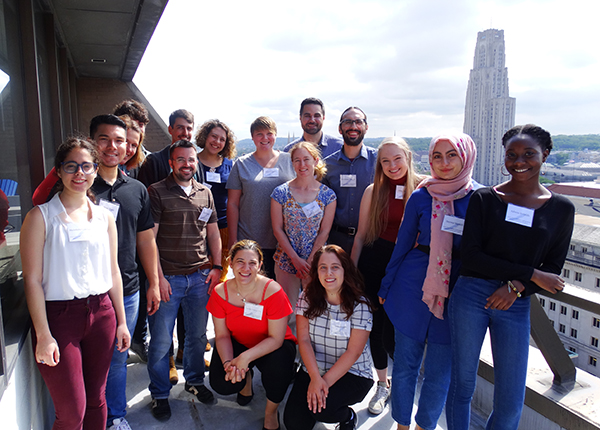
LRDC Director's Fellowships: The LRDC Director's fellowships supports PhD study for students whose backgrounds include being part of a historically under-represented U.S. minority groups. Current PhD students or students being considered for admission to a PhD program in one of LRDC's partnering departments are eligible to be nominated for a fellowship. Annual nominations are generally due by early February.
LRDC Graduate Student Council Award: The LRDC Graduate Student Council Award is designed to support the development of new, innovative, and interdisciplinary research conducted by graduate students within the LRDC by providing funds to enable students to complete their research. Each semester two awards of $500 each are awarded.
LRDC Undergraduate Summer Research Internship (also above under Diversity & Inclusion): offers undergraduate internships to promote broader participation in training in the Learning Sciences. LRDC interns gain experience in the Learning Sciences (research on instruction and learning) by working on a project with a faculty member who specializes in this area. Visit the LRDC Undergraduate Summer Research Internship page.
Tim Post Award: The Tim Post Award is awarded to a graduate student in Developmental or Cognitive Psychology for a highly significant research project. The award of approximately $500 is to be used to further the student's professional development. More information on the Tim Post Award.
Career Preparedness & Recognition
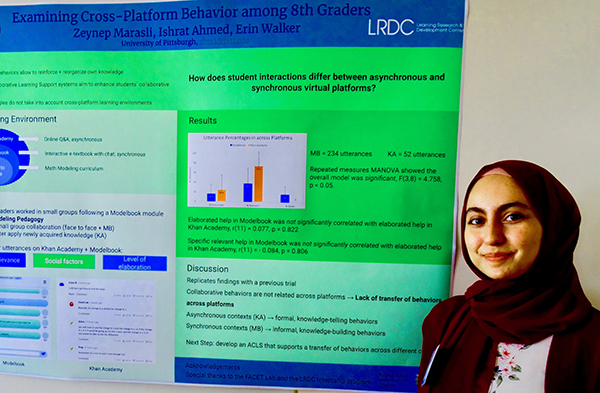
Presentations: In addition to publishing papers in renowned journals, graduate students present papers and posters at national and international conferences and the University of Pittsburgh Grad Expo, and the Computational Medicine Conference.
Awards: Through high caliber mentoring and support for student research initiatives, a large number of LRDC graduate students garner professional awards and fellowships each year.
Professional Development: A faculty-student Professional Development Committee in the Psychology Department helps to ensure that students have the support and resources they need to explore and nurture career options. This committee offers workshops open to all students. Visit the Department of Psychology Outcomes.
Contact Us
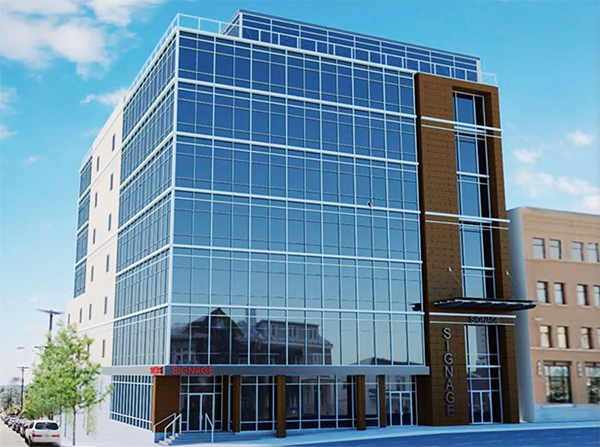
Top of page



